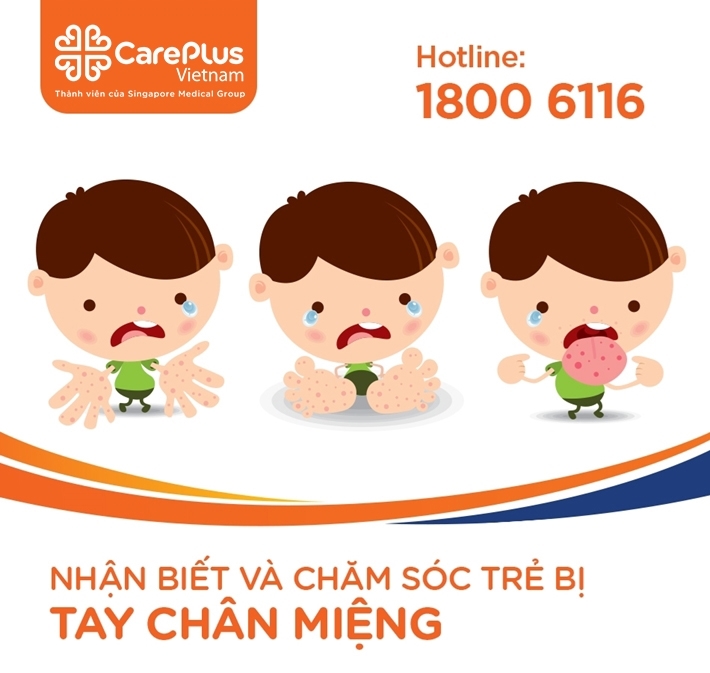The hand, foot and mouth season is back
''In the first week of July, the number of children visited and hospitalized with dengue fever and hand, foot, mouth disease (HFMD) increased. Experts predict that the peak season of dengue fever and HFMD is back. '' (Source: Youth Newspaper) Therefore, parents need to know the signs of the disease to have proper care and effective prevention to protect children from HFMD.

7/16/2020 9:44:00 AM
1. What is the hand, foot, and mouth disease (HFMD)?
HFMD is an acute infectious disease caused by intestinal viruses. Two common pathogens are Coxsackievirus A16 and Enterovirus 71 (EV71). The disease can be found at any age but common in children under 5 years old, especially children under 3 years old.
2. What are the symptoms of HFMD?
Approximately 3-6 days after having HFMD, the first symptoms are low fever, fatigue, sore throat, irritability, anorexia. Children infected with EV71 often have more symptoms of diarrhea several times a day, vomiting. Subsequently, a rash with small blisters appears on the buttocks, pillows, palms, soles of the feet, fingers, and toes and is usually painless pressure.
Blisters in the skin will go away on their own, possibly leave bruises after 5 to 7 days, rarely get ulcers or superinfection. Bubbles also appear in the mouth, cheek lining, gums, tongue, throat, and when it ruptured, sores in the mouth cause pain and anorexia, salivation. Symptoms in the first few days are usually worst but disappear completely within a week.
3. Is HFMD serious?
Most of the cases go away on their own. The most common consequence is dehydration because the baby doesn’t drink enough water due to mouth pain. However, recently, when the disease outbreak again, it shows that EV71 can damage the central nervous system and cause serious systemic complications that lead to the dead, especially children under 5 years old.
4. How to take care of a child with HFMD?
Fever reduction: You can use paracetamol or ibuprofen to reduce fever and relieve mouth pain. The dosage depends on their weight and doctor’s guidance. Wear thin and airy clothing for your child.
Feed them more liquid foods that are easy to eat and digest. Paracetamol or ibuprofen can also help relieve mouth pain.
5. Is HFMD contagious?
Children with HFMD can spread out the virus to everyone around them. The most contagious period is the first week, so children should be kept out of school for at least 1 week to 10 days.
6. How does HFMD spread?
The virus usually spread through person-to-person interaction in different ways:
Respiratory:
- Contaminated viral droplets released from the respiratory tract when a child coughs, sneezes, or talks.
- Contaminated by respiratory tract secretions (nasal mucus or saliva) on items infected.
Fecal-oral route: By the stool of an infected child, usually, the child's hands are contaminated while using the toilet, then they touch and contaminate their surroundings. Other healthy children may touch these objects, then accidentally put their hands in their mouths and become infected.
7. How can parents prevent and control the spread of HFMD?
- Teach your child to cover their mouth and nose when sneezing or coughing with a tissue, or with a sleeve. Teach them to wash their hands right after touch mucus. Change contaminated clothing.
- Wash hands after changing diapers.
- Wash and disinfect toys
- Avoid sharing food, drinks, or sharing personal items such as utensils, toothbrushes, and towels.
- Do not hug, kiss, and share drinking cups or keep your child in the same room. Leave them separated during periods of highest infection.
- Disinfecting surfaces or objects that patients touch to prevent infecting for their siblings
8. Can a child go to school with HFMD?
Usually, children can attend school unless:
- The child is unwell or has a fever.
- Children have many mouth sores.
- Or the teacher cannot take good care of the child.
Ideally, children should rest at home during the first week so that parents can follow up to detect serious signs earlier. At the same time, this is the most infectious stage of the disease, leaving children at home helps to limit the spread of the disease.
9. Will a child get HFMD again? Children can still get the disease again due to infection with the same virus before or by another virus.